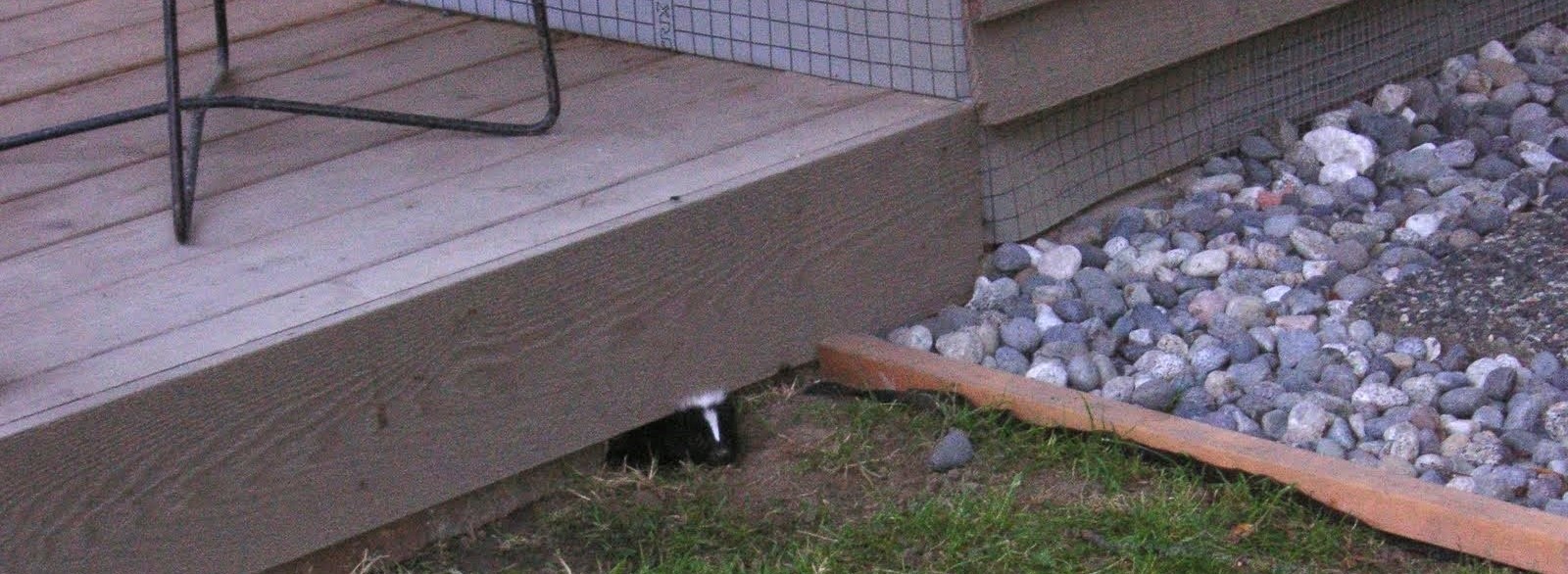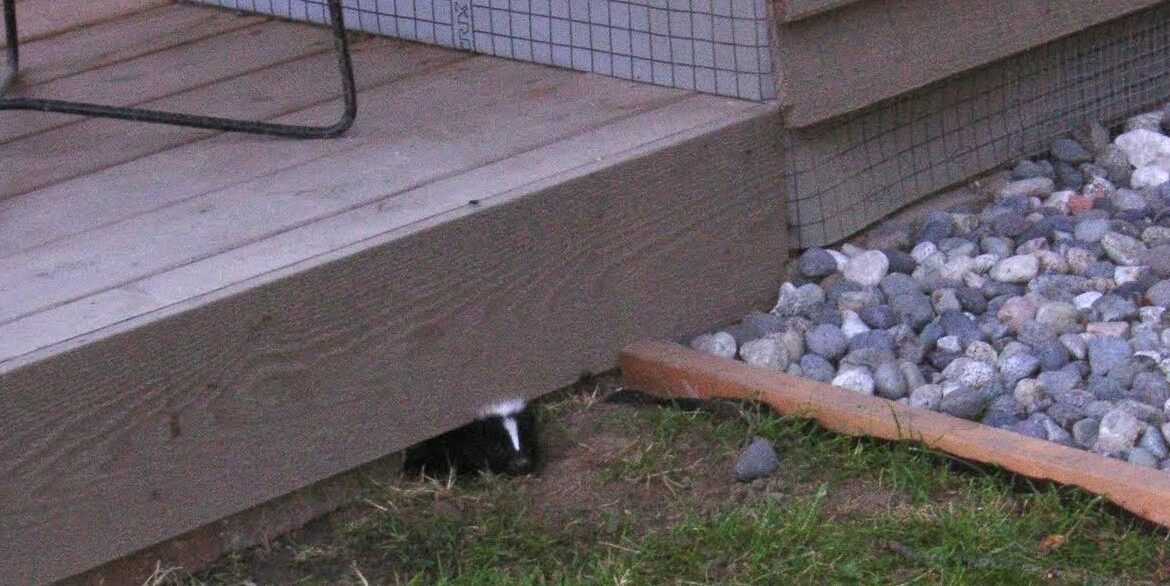You might think skunks are just smelly animals, but they’re actually nature’s secret superheroes. These black-and-white creatures play a huge role in keeping the environment balanced.
From pest control to improving soil, skunks and ecosystem benefits go hand in hand. They’re busy every night helping plants grow, spreading seeds, and keeping pests in check. This is how skunks help the environment and why their ecological role is so important—even in places like Andover.
Skunks eat insects, rodents, and other pests that can harm plants or spread disease. They also dig in the soil, which helps water and nutrients reach plant roots.
At Skedaddle Humane Wildlife Control in Andover, we understand how valuable skunks are to the ecosystem.
That’s why we use humane methods, like one-way doors, to let them leave your property safely while keeping them from coming back.
In this post, we’ll explore how skunks go from “stink to sweet” by helping the environment in ways you might not expect.
Nature’s Pest Control Team
Skunks are like tiny cleanup crews that work all night long. They have huge appetites for insects that can damage your garden and yard. How skunks help the environment starts with what they love to eat most – bugs.
These animals munch on:
- Grubs that destroy grass roots
- Beetles that harm plants
- Crickets and grasshoppers
- Cockroaches and other unwanted insects
- Mice and rats that spread disease
A single adult skunk can eat up to 70 insects in one night. That means fewer pests bothering your plants and fewer bugs trying to get into your home. Farmers especially appreciate skunks because they keep crop-damaging insects under control naturally.
The skunk ecological role as pest controllers helps reduce the need for chemical sprays. This creates a healthier environment for everyone. When skunks control pest populations, plants can grow better and other animals have cleaner spaces to live.
Soil Aerators and Garden Helpers
You might not like seeing small holes in your lawn, but skunks are actually helping your soil when they dig. Skunks and ecosystem benefits include making soil healthier for plants to grow.
When skunks dig for grubs and insects, they:
- Mix air into packed dirt
- Help water reach plant roots better
- Move nutrients around in the soil
- Create space for new plant growth
Think of skunks as tiny gardeners with built-in tools. Their digging might look messy, but it serves an important purpose. The holes they make let rain soak deeper into the ground instead of running off the surface.
This natural soil mixing helps grass grow thicker and stronger. Plants get better access to nutrients and water when the soil isn’t packed down tight. Even though skunk holes might annoy homeowners, they’re actually signs of healthy soil improvement happening naturally.
Seed Spreaders and Plant Partners
How skunks help the environment includes being excellent gardeners without even trying. These animals eat lots of fruits and berries, then spread the seeds around through their waste. This helps new plants grow in different areas.
Skunks enjoy eating:
- Wild berries and fruits
- Nuts and seeds
- Root vegetables they find
- Plant bulbs and shoots
When skunks travel through different areas, they carry seeds in their stomachs. Later, when they leave droppings, those seeds get planted in new spots with natural fertilizer. This process helps forests and wild areas stay diverse and healthy.
Many native plants depend on animals like skunks to spread their seeds. Without this natural seed distribution, some plant species might not survive or spread to new areas. The skunk ecological role as seed spreaders helps maintain plant diversity across different habitats.
Keeping Animal Populations Balanced
Skunks help keep other animal populations from getting too large. They eat small rodents like mice and young rats that can cause problems when their numbers grow too high. This natural balance helps prevent disease spread and property damage.
The skunks and ecosystem benefits include controlling populations of:
- Field mice that eat crop seeds
- Young rats that can carry disease
- Insect larvae that become pest problems
- Small animals that damage stored food
When skunk populations are healthy, they help prevent mouse and rat explosions that can happen in spring and fall. This natural population control protects food supplies and reduces disease risks for other animals and humans.
Even in suburban areas like Andover, skunks continue this important work. They keep rodent populations manageable without requiring human intervention or harmful chemicals.
Natural Cleanup Crews
Skunks aren’t picky eaters, which makes them excellent cleanup crews for the environment. They eat carrion (dead animals) that might otherwise create health problems or attract flies and other pests.
This cleanup service includes:
- Removing dead insects and small animals
- Eating fallen fruit that might rot and attract flies
- Cleaning up food scraps that other animals leave behind
- Processing organic waste that helps recycle nutrients
The skunk ecological role as natural cleaners helps prevent the buildup of decaying material that could create bad smells or health hazards. They’re like tiny garbage trucks that work for free all night long.
This cleaning behavior also helps prevent disease spread. When skunks remove dead animals and rotting organic matter, they reduce breeding places for harmful bacteria and insects that can carry diseases.
Supporting Other Wildlife
How skunks help the environment extends to helping other animals, too. When skunks dig their burrows, they often abandon them after a season. These empty burrows become homes for other animals like rabbits, opossums, and ground-nesting birds.
Skunk burrows provide:
- Safe nesting spots for smaller animals
- Protection from weather and predators
- Ready-made homes that save energy for other animals
- Underground shelter during extreme temperatures
The presence of healthy skunk populations also indicates good ecosystem health. When skunks thrive, it usually means there are plenty of insects, small rodents, and plant foods available. This suggests the whole ecosystem is working well.
In areas like Andover, skunks help maintain the delicate balance between urban development and natural habitats. They adapt well to living near humans while continuing their important ecological work.
Year-Round Environmental Workers
Skunks stay active almost all year, which means their environmental benefits continue through different seasons. Unlike animals that hibernate, skunks only slow down during the coldest weather. This makes their skunks and ecosystem benefits available when ecosystems need them most.
During different seasons, skunks help by:
- Spring: Controlling emerging insect populations
- Summer: Managing peak pest activity
- Fall: Processing fallen fruits and preparing soil for winter
- Winter: Continuing pest control during mild weather periods
Their year-round activity means consistent ecosystem services. Plants and other animals can count on skunks to maintain their helpful roles regardless of the season.
Sweet Solutions for Coexistence
Understanding the skunk ecological role helps us appreciate these animals instead of just seeing them as problems. How skunks help the environment shows they deserve respect as valuable ecosystem partners.
The skunks and ecosystem benefits we’ve explored prove these animals earn their place in nature. From pest control to soil health, from seed spreading to natural cleanup, skunks work hard to keep environments healthy and balanced.
When you see signs of skunks in Andover, remember they’re probably busy helping your local ecosystem. However, if skunks become too close to your home, Skedaddle Humane Wildlife Control in Andover offers professional solutions.
We use one-way doors that allow animals to leave safely while preventing their return. This humane approach respects the important work skunks do while protecting your property.
Ready to learn more about living peacefully with wildlife? Request an estimate from our team to discover how we can help you coexist with nature’s hardest workers.




